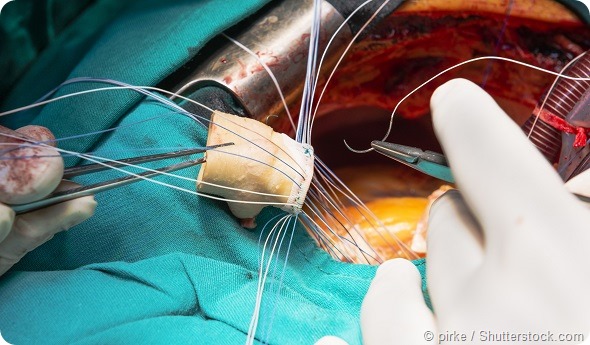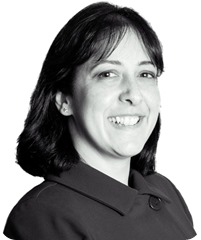Aortic stenosis means narrowing of the aortic valve, which is the out flow valve from the left ventricle, the pumping chamber of the heart. This is the valve which opens to allow blood to flood out of the heart and all-round the body.
When the valve is narrowed it doesn’t open all the way, so not enough blood gets out of the heart with each beat. What this means is that less blood is getting to the vital organs including the brain, meaning the main symptom of this condition is tiredness and shortness of breath
Recent research showed that 94% of respondents don’t know what aortic stenosis is, what challenges can this produce?
The recent UK heart valve disease survey of 1411 people over the age of 60 in the UK has indeed told us that 94% of people are not familiar with aortic stenosis as a condition, even though it is the most common form of heart valve disease in this age group.
The main challenge for us as health care providers is that if people are not aware that their symptoms are significant then they won’t come forward for assessment. Therefore we don’t have the opportunity to offer them treatment, which is potentially lifesaving and certainly has the option of improving their quality and length of life.
HVV Recommendation 2 - Campaign to Raise Awareness of Heart Valve Disease
What are the symptoms of aortic stenosis? Does this contribute to the lack of knowledge of this disorder? What should people look out for?
The main symptoms is shortness of breath, doctors call this ‘dyspnea’. One of the problems with shortness of breath as a symptom is that the majority of people expect to feel slightly unfit as they get older, this means that when they do feel a little bit puffed carrying out daily activities, people tend to ignore that or brush it off as being a normal part of getting older.
Whereas in fact it could be a very important sign of something going on with the heart. What we are trying to say at Heart Valve Voice is if you do notice that you seem a bit more puffed then usual when you are putting out your washing, walking up the stairs or when you are lifting your grandchildren, then ask your doctor to listen to your heart.
It takes 20 seconds and if the examination is normal then you haven’t lost anything, but if your doctor notices a heart murmur which can be a sign that something is wrong with one of the valves, then that could be setting you on the road to getting the right treatment for a heart valve problem.
What is your prognosis if you have aortic stenosis? How does this compare with other major illnesses such as cancer or Alzheimer’s disease?
There has been a lot of research into this over the years and it’s actually an increasingly complex and interesting area, while your aortic stenosis is asymptomatic, in other words if you generally have no symptoms then your prognosis is very good, however, as soon as you become symptomatic even with mild shortness of breath then the prognosis is much worse.
In the case of severe aortic stenosis, once symptoms develop there is a 50% chance of dying over the next 2 years. To put that into lay terms that means that half of all patients with symptomatic severe aortic stenosis may die within 2 years of having the diagnosis made unless it is treated.
That is a far worse prognosis then the prognosis from many cancers or Alzheimer’s disease, which the heart health survey has told us people are much more concerned about.
How does that prognosis compare to the perception of these conditions?
So what we are basically saying here at Heart Valve Voice is that if you have severe aortic stenosis and you are short of breath or you feel slightly dizzy or if you have any chest tightness or chest pains then you actually have a very very serious prognosis.
Over the next 2 years there is a 50/50 chance that you might die, so you need to come forward early and get treated.
Early detection and diagnosis of heart valve problems allows patients to receive treatment in a timely manner and prevent early deaths from a treatable condition, the more hearts that we listen to the more lives we can save.
What treatment options are there for this disorder?
Over the last 2 decades there has been major advances in the treatment options available particularly for aortic stenosis, 20 years ago the only real option was for patients to undergo open heart surgery to replace the valve.

Artificial heart valve implantation through open heart surgery. © pike / Shutterstock.com
Heart surgery is still the right option for many patients and I have to emphasize that aortic valve replacement really is not considered to be a high risk surgery. With 100 people undergoing surgical aortic valve replacement, as a cardiologist I would expect 99 out of those 100 people to leave the hospital fit and well.
Aortic valve replacement in the 21st century is a safe operation, however, there are even more exciting options available to patients now, for some patients particularly the more elderly and slightly more frail we can now replace the aortic valve through a tiny cut made in the blood vessel at the top of the leg.
We call this a ‘transcatheter aortic valve replacement’ and while the treatment is not suitable for every patient it is an excellent treatment with a very rapid recovery rate. It is particularly useful for older and slightly frailer patients.
What research has there been into aortic stenosis and the potential treatments for the condition?
Over the last 20 years there has been a focused effort on research into heart valve disease in general in order to find ways to treat the condition in less invasive ways, without open heart surgery.
There have been a number of major multicentre international trials carried out over the last decade demonstrating the feasibility and benefits of transcatheter aortic valve replacement. In the United Kingdom there is an important randomized trail going on called ‘UK TAVI’.
This is a trail where patients are given the option to be randomized to have their aortic valve replaced either through standard surgical method or through the transcatheter method. It’s important that patients are given the opportunity to take part in trials because otherwise we’re not going to get the answers we need to make progress in the management of heart valve disease.
What does the future hold for aortic stenosis research?
Despite the great advances that has been made over the past 2 decades we are certainly not sitting back on our laurels as doctors and scientists, we would like to improve the currently available technology so that the less invasive techniques become available for more and more patients.
We would also like to find ways to prevent the development of age related narrowing of the heart valves if possible and there is quite a lot of research going on into this area at the moment.
Where can readers find more information?
For more information about heart valve disease and particularly about trials going on you can visit our website www.heartvalvevoice.com
About Dr Shelley Rahman Haley
Dr Shelley Rahman Haley is a consultant cardiologist and was appointed as the first clinical lead for echocardiography at Harefield Hospital. She qualified with honours from Cambridge University School of Clinical Medicine in 1995 and trained in cardiology with a sub-specialty interest in non-interventional cardiology, echocardiography and cardiac imaging at Papworth, Royal Brompton and St Thomas’s hospitals.
She now focuses on research connected with mechanical circulatory support, cardiac and lung transplantation, and heart valve disease. She works closely with the surgical teams at Harefield Hospital to assess patients who may require surgery and monitoring their progress afterwards.